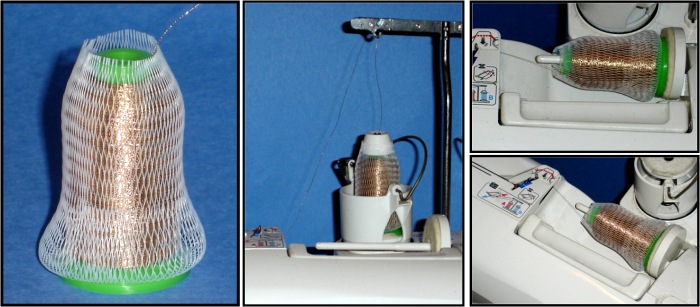Dealing with Metallic Thread:
Here are several tips for working with metallic thread. (These rules apply to any thread brand.) We hope that they help you to get the best out of your metallic thread, because they are definitely more challenging to handle than regular embroidery thread.
If you experience any trouble with metallic thread, please try the following steps, in this order:
1. Make sure you use a quality, new, SHARP "Metallic Needle." (Metallic needles have a larger eye, which allows metallic thread to run more smoothly. Often, this eye has Teflon coating, for even better effect.)
2. If you see that the thread is coming off of a spool too easily and is causing loops and knots at the very beginning, try using a thread net (spool net). These can really help with looping issues, and they cost only pennies. Here is what a thread net looks like (the first photo shows a closeup of thread net on metallic thread cone, the second is a photo on cone with net in vertical position, and the last two pictures - in horizontal cone position):

Most metallic thread, especially the brands that have a high sheen and really are "metallic," have this looping problem. But it's an issue that is easy to solve, while the benefits of using shiny metallic thread are huge.
Another possible solution to "early looping" problems is to use a QUALITY vertical thread stand (thread feeder), as this issue is especially noticeable on machines that have horizontally positioned spool. If you have a good thread stand, it's worthwhile to try it.
3. Machine speed should be reduced. Try the lowest speed you can set on your machine, and observe the results. Move the speed up, little by little, until the point where it begins to cause thread breakage. Turn the speed down a bit down from there, to the best point of good performance.
4. Make sure the top thread tension is not too high for a metallic thread. Usually, metallic thread require a lower thread tension than regular embroidery thread. Lowering the tension can also help guard against shredding.
5. Make sure that your DESIGN is suitable for metallic. Many designs are digitized in such a way that they work badly with any metallic thread. When working with metallic thread, avoid designs with following properties:
5.1 Many overlapping objects that create 3 and more stitch layers
5.2 Designs with many small stitches
5.3 Designs with very dense areas
6. Make sure that you're using an appropriate backing. Metallic thread usually work MUCH better with backings that have a Viscose or Cotton component in them. 100% polyester backings are usually quite sturdy, and tend to create too much friction with needle and thread. This friction can cause unwanted thread breaks. Whenever you can, use a backing with a viscose or cotton component. Soft cutaway backings usually work best with metallic thread.
7. Make sure that you're using an appropriate fabric type. Fabric that is too thick or dense can cause unwanted friction, therefore causing metallic thread breakage. When working with metallic thread, always try to use soft materials and natural fibers.
8. Some metallic thread work better if they're cooled in a freezer for several minutes before embroidering.
We hope these tips help!
P.S.
To purchase ThreaDelight metallic thread, please click here. You'll find 16 gorgeous colors.
And here's a link to designs set that was digitized especially for use with metallic embroidery thread. It's a perfect set for Christmas gifts. FAST Christmas gifts - like these postcards, for example!
Wish you a Most Wonderful Day & Happy Embroidering!
|
